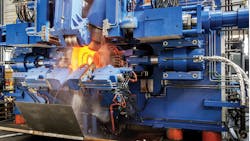Integrated Forming and Rolling for Railway Wheels
Turkey is an emerging manufacturing market, and a good place for machine builders to land new orders for their products. In the case of Schuler Inc., Turkey has delivered the largest single order in its 174-year history – a new line to produce railway wheels at Karabük Iron & Steel Industry and Trade Inc. (Kardemir), an integrated steelmaker that sees an opportunity to expand into that forging specialty.
“With our high-quality steel, we are able to produce top-class forged wheels that meet the needs of a high-speed rail network,” according to Kardemir’s CEO, Fadil Demirel. Kardemir already produces rails and switch points for high-speed railroads, and with the state investing heavily in such projects now, aiming to double the national rail network to 25,000 km by 2023, the steelmaker will add a novel forging process to its capabilities.
The contract placed with Schuler is worth a reported €90 million ($122 million), and will be capable of producing 200,000 forged wheels per year with an average blank weight of 500 kilograms.
“This order confirms our successful strategic diversification into promising market segments like railway, and underlines our high technological expertise,” stated Stefan Klebert, CEO of Schuler AG.
The process technology involved is one that Schuler introduced a year ago, and supplied in 2012 to a Chinese manufacturer. The core of the integrated process line is a machine the rolls the wheels without using a mandrel. “Highly dynamic servo motors transfer the torque of the main drives via web rolls onto the pre-forged blank,” according to Dr. Watler Osen, who heads Schuler’s Forging business unit. “Together with the main roll and conical rolls, the web rolls form an almost fully finished railway wheel from the blank. Finally, the hub is offset axially and broached, and the wheel is calibrated.”
With the servo motors as the power source, the machine can roll a wheel in less than 20 seconds, though in practice it is projected to produce up to 75 wheels per hour.
The machine is capable of producing various wheel geometries, too. Along with railcar and locomotive wheels with diameters of up to 1,450 mm and rim widths of 175 mm, the system can manufacture crane wheels with rim widths up to 300 mm.
According to details Schuler reported in 2012,customized software lets the operator simulate the entire forging process. An integrated FEM program compares the product parameters with a forming process model, and the resulting data is transferred directly to the forming machine.
In addition to the wheel rolling machine, the line includes three high-performance hydraulic presses. A preform is forged by two presses with press forces of 5,000 and 10,000 metric tons. After rolling, a 5,000-ton crimping and piercing press is the final process step.
Schuler’s installation also will include testing systems for the finished wheels.
The project will be the first one that Schuler will execute with Andritz Maerz, a unit of the Andritz Group, which acquired Schuler earlier this year.
Andritz Maerz will install hardening, low-temperature, and rotary hearth furnaces as well as the hardening machine with automated handling capability for the railway wheels. The heat-treating system use car-bottom pusher-type furnaces developed by Andritz Maerz that ensures the hardness and structural requirements railway wheels used on high-speed trains.
